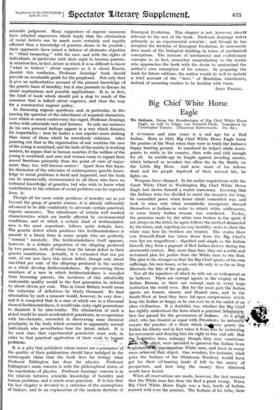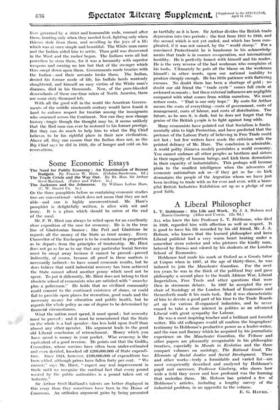Big Chief White Horse Eagle
We Indians. Being the Recollections of Big Chief White Horse Eagle, as told to Edgar von Schmidt-Pauli. Translated by Christopher Turner. (Thornton Butterworth. 10s. 6d.)
A HUNDRED and nine years is a sad age for a Red Indian. Born in 1822, Big Chief White Horse Eagle knew the prairies of the West when they were in truth the Indian's happy hunting ground. In manhood he helped white immi- grants to settle in his country, then wide and rich enough for all. In middle-age he fought against invading armies, which behaved as invaders too often do, in the Battle on the Little Big Horn. And now, most of his fellows dead and his people deprived of their natural life, he fights on.
Weapons have changed. In his earlier negotiations with the Great White Chief in Washington Big Chief White Horse Eagle had shown ,himself a_ realist statesman. Knowing that the Indians were too, divided to resist the invaders for long, he counselled peace when lesser chiefs counselled war, and took to arms only when scoundrelly immigrants dressed themselves as Indians in order to attack white settlements, or some lonely Indian woman was murdered. TO-day, the promises made by the white men broken in the spirit if
not always in the letter, he again follows the method demanded by the times, and, rejecting an easy hostility, seeks to show the white man how his brothers are treated. The stories Herr von Schmidt-Pauli has taken down from the Big Chief's own lips are magnificent : dignified and simple as the Indian himself, they form a pageant of Red Indian history during the nineteenth century. But, more than that, they arc a noble and restrained plea for justice from the White man to the Red. The plea is the stronger in that the Big Chief speaks of his own sufferings, his own losses, or his own life only in so far as they illustrate the fate of his people.
Not all the injustices of which he tells are so widespread as
he believes. There are corrupt agents in the employ of the Indian Bureau, as there are corrupt men in every large institution the world over. But for the most part the Indian agents are honest, sincere, and ill-paid men, and in the South-West at least they have hit upon compromises which keep the Indian as happy as he can ever be in the midst of an alien civilization. It is doubtful, too, whether the Big Cidef has rightly understood the Jaws whicha paternal Admoi.str* tion has passed for -the governance_of Indians. As a greili chief, who has treated as equal with Presidents, he naturallyir • resents the* practice of a State which ingaeory grants the Indian his liberty and in fact takes it fromMni by restricting
his movement and denying him the right to buy and sell. But
t1 r Active41 ctive laws, unhappy though: they may sometimes 'th effect, were intended to preserve the Indian from 8xploitati . ;:ainscaupulous White men, and have in many cases achieVed that object. - One wonders, for instance, what price the Indians of the Oklahoma Territory would have got for their oil-bearing lands if left to the mercy of prospectors, and how long the money thus obtaine4 would have lasted.
When all reservations are made, however, the fact remains that the- White. man has done the Red a great wrong. When Big Chief White Horse Eagle was a boy, herds of buffalo roamed wild over the prairies. The Indians of his tribe, their
lives governed by a strict and honourable code, roamed after them, hunting only when they needed food, fighting only when thieves stole from them, and revelling in the joys of a life which was at once simple and beautiful. The White man came and the Indian aided him to settle. Then gold was discovered in the West and the rushes began. The Indians were all but powerless to stem them, for it was a humanity with superior weapons and owning no law but that of the stronger which thus swept down upon them. Governments made treaties with the Indian—and their servants broke them. The Indian, denied his former mode of life, his buffalo herds wantonly slaughtered, and himself an easy victim of the White man's diseases, died in his thousands. Now, of the pure-blooded descendants of these one-time rulers of North America, there are some sixty thousand left.
With all the good will in the world the American Govern- ments of the middle nineteenth century would have founfi it hard to enforce respect for treaties among the immigrants
who swarmed across the Continent. Nor can they now change history : tragic though the thought may be, it seems unlikely that the Red man can ever be restored to his former prestige. But they can do much to help him to what the Big Chief believes to be his rightful place in their new civilization. Above all, they can ensure that the Indian does not, as the Big Chief says he did in 1929, die of hunger and cold on his reservations.















































 Previous page
Previous page